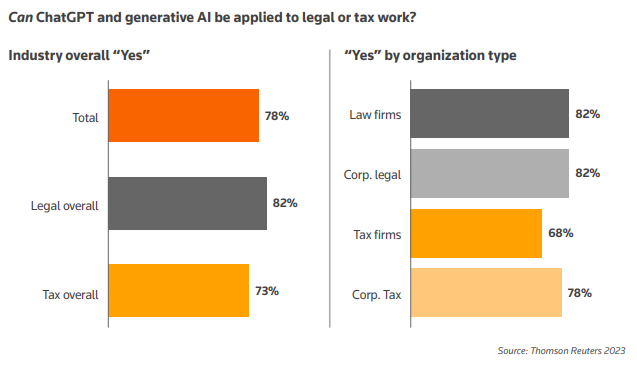ChatGPT and Generative AI in Legal, Corporate & Tax Markets: Key Takeaways

New Thomson Reuters research uncovered a mix of optimism and caution in the adoption of generative AI among legal, tax, and accounting firms in the United States, UK, and Canada. ChatGPT and Generative AI in Legal, Corporate & Tax Markets further expands on findings released in the ChatGPT & Generative AI within Law Firms report, which explored legal professionals’ attitudes towards these emerging technologies.
Legal Current shares top takeaways from the latest report.
- Professionals recognize the potential for generative AI – particularly in the legal space. Among respondents, 78% believe generative AI tools can enhance legal or accounting work, with the proportion slightly higher for legal (82%) than for tax (73%).
- Risk concerns are a barrier to adoption. Among respondents, 69% expressed concerns over risks, including accuracy, privacy, confidentiality, and security. These concerns reflect the need for establishing trust as well as furthering education and strategic planning around the implementation of generative AI tools.
- Adoption rates will likely remain low until these concerns are addressed. Only 4% of respondents currently use ChatGPT and generative AI in their operations, with an additional 5% planning to do so. Tax and accounting firms are more open to the idea, with a 15% adoption or planned adoption rate. Also notable is that the use of other forms of AI, beyond ChatGPT, is significantly higher among law firms (17%) compared to accounting firms (10%).
- Research is the primary use case among those who have adopted or plan to adopt generative AI tools. About two-thirds of respondents in corporate legal and 80% of those in tax identified research as the most compelling use, followed by knowledge management, back-office functions, and question-answering services.
- Few organizations are limiting their employees’ use of generative AI. Despite concerns around accuracy, privacy, confidentiality, and security, only 20% of respondents said their firm or company has warned employees against the unauthorized use of generative AI at work. Just 9% of respondents indicated their organization had banned unauthorized use of generative AI.
These findings align with the perspectives legal professionals shared earlier this year in the ChatGPT & Generative AI within Law Firms report, which found that lawyers are aware of generative AI yet uncertain about applying the technology to their work. The report noted legal professionals are concerned about the technology’s “hallucinations” and that it may threaten jobs, yet excited to apply it to their work.
Read more of the legal industry’s reaction to the initial report. For more insight on legal, tax, and accounting professionals’ attitudes on the opportunities and potential risks of generative AI, download the latest report.